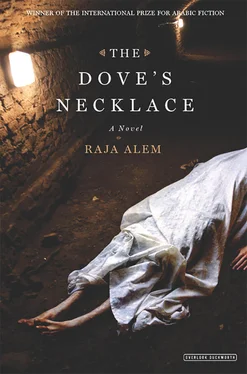Joyful pilgrims traveled to see him from all over the Arab lands, to meet him between his two gardens of paradise, among the sweet clouds of song gathered around him, raining torrents over the Hadramawt Valley for three consecutive moons and showing Joseph the secret that gave that land its nickname, “the Happy Land of Yemen.”
On Joseph’s seventh sunrise between the two temples, he was awoken by the soft scent of incense, and when he opened his eyes, glittering strips of light on the horizon dazzled him. The mountain opposite looked like it was covered in solid gold bricks; when he looked more carefully, he could make out hundreds of doors covering the entire surface of the mountain. He rushed toward them blindly, desperate to get inside, but when he reached the mountain the doors had melted into one huge gate that was firmly closed against him. No matter how hard he knocked, no answer came. At sunset, the doors faded away and he wondered if it had all been a mirage; nevertheless he didn’t dare leave.
Dawn after dawn, those shining doors reappeared, but each time he approached they would be transformed into that single, closed gate. He got thinner and thinner, surviving only on the water and goat’s milk brought to him by the girls of Solomon’s Seal, near Ma’rib, girls who were the descendants of Solomon and Bilqis.
“These are doors between the parts of Creation,” they told him. “Between animal, vegetable, and mineral, between tongues, between life and death and God knows what else … Some of them opened for the prophet King Solomon, and that’s how he earned the name “King of the Genies,” but those doors have never opened for another living being. It all comes down to keys. You’ll have to find the original key before you start dreaming about one of those doors opening for you!”
The sun peeled Joseph’s skin and grilled his flesh a dark, aromatic teak while the moon polished him to a silver gleam; his coal-black braids grew longer. He was getting thinner still, as thin as a key, but whenever he approached a door, the closed gate would stand in his way. At the age of seventy, having never lost hope, he woke up to find that his seed had caused the bellies of the Solomon’s Seal girls to swell. When the pains of labor took them, and the ground of the two gardens shook, all he remembered was the first girl to be born. She had a moon-shaped birthmark on her palm. Joseph’s memory kept the sandstorm that had covered the mountain: when it finally abated, the mountain had vanished behind a veil that made it difficult to see; countless doors were scattered all over the valley bed and figures that looked like a band of beggars flocked from everywhere on earth and began to collect the doors, piling them up on a huge bonfire that they’d lit to help them see.
“It is not the destiny of Eve’s sons to possess these doors, and it is a curse to try to break the locks preserved in the tablets,” he was warned, but Joseph ibn Nagrela slipped away from them and plunged his bare hands into the fire to save the doors, forgetting all about his newborn daughter who had disappeared with the rest of the village of Solomon’s Seal and forgotten the earthquake she’d been born into.
Joseph ibn Nagrela returned with a cargo of doors to Andalusia. In Toledo, he went to visit all the most famous blacksmiths whose skill in forging knives and swords and casting keys was incomparable, and wasted the last quarter-century of his life in its hills, casting key after key with the locksmiths, casting and re-casting in search of the one key that would open all those doors. The locksmiths said that he used all the songs, poems, dances, prayers, and charms he’d learned at the temple of Almaqa to help him, but none of the hundreds of keys that they cast was the ultimate key that could open those locks.
When Joseph ibn Nagrela was one hundred, they forged a key that opened door after door, until there was only one door left, but the excitement split Joseph’s heart in two and he dropped dead in this mosque. In the commotion surrounding the death of such a legend, the key was lost. When this apse was built, the doors were affixed around the walls, where they appeared only to those endowed with vision, inspiring creators like El Greco to search, in their own works, for the ultimate key that would open the door between humans and the divine.
A back window smashed and Rafi burst in. He was irate, but he stopped to see if Nora was alright. “Are you okay? You can’t imagine how scared I was,” he gasped. In the same breath he turned to the woman, yelling, “Are you insane? What the hell were you thinking?” The delicate touch of Nora’s fingers on his arm calmed him, and the strange gleam in her eyes struck his heart like a feverish glow, but with a queer luminosity; he felt her gaze restrain him.
“What a great bodyguard I am,” he muttered to himself. “Letting an old woman trick me!” He pushed forward into the dark mosque, shining all his suspicion at the corners to uncover the woman’s schemes, but she paid no attention to him and carried on telling Nora her story. Nora flopped back against the wall, suddenly tired, and ran her tongue over her lips to moisten their sudden cracks.
“Now. Close your eyes and imagine your Arab ancestor: once, a man came here burdened with the same longing as is in your face now. He made the opposite journey to Joseph ibn Nagrela’s voyage to Aden in search of the door: your ancestor from the Shayba Tribe crossed the seas from Aden to here looking for a key that would open a single door, that of the house of God, but instead all he found was these doors and locks.” Nora was lost amidst those mirror-image journeys; one man went after a door and another came after a key.
“Here.” She pointed to a patch on the floor of the temple and pushed Nora toward it so she could receive the vision. “Al-Shaybi spent a quarter of a century in this spot looking after the mosque, tracing the steps of Joseph ibn Nagrela, and the key to the absolute.” Rafi lingered in the apse, looking fervently for the doors that had been revealed to Nora, but the woman dragged him out. It was then that they noticed the parchment in a wooden frame, studded with shimmering gold and tiny red and green flowers, which hung on a ravaged fresco as if guarding the entrance to the apse. The woman stopped to explain: “In this sheet, al-Shaybi recorded his faith; it always pointed toward his qibla, your city, Mecca.” The writing on the parchment captured Nora’s attention; it was an old form of writing that bore no dots, so each word could be any one of numerous words and its meaning any one of many meanings.
“It’s the first page of the Surah of the Night Journey,” Rafi explained in an attempt to break the magic the woman was spinning around Nora.
“I’ll tell you more about this al-Shaybi,” she went on. “Many people have come looking for him, but I’ve kept his story a secret, waiting for a sign.” She looked at Nora. “Follow me.” She set off out of the mosque, striding through the cold high Toledo night. Around them and at every corner as they climbed the hills they could hear unseen footsteps kindled by their thudding heartbeats. Nora shivered and clasped Rafi’s arm, and he pulled her to his ribs, placing his hand over her icy fingers.
They ended up at the boarding school where they’d first met the woman that morning. In the night, the building showed its bitterness; it looked ready to jump off into the abyss behind it.
“Come in. Shhhhhh — any movement might wake the building …”
Rafi hesitated, but Nora stepped through the short wooden door, clutching his arm. The woman led them into a narrow corridor and down the staircase at the end of it to a vaulted cellar that stank of damp paper and desertion. She turned to look at them. “I’ll take you to the refuge where I hide from every fear and weakness.” Her voice stumbled thickly as if fumbling its way through the darkened alleyways of the purplish night. Nora felt dizzy in the dim light and a shiver ran from her body to Rafi’s; they were now more certain than ever that this woman was deranged. She waved at the walls, which were covered in overflowing bookshelves. “We all have our own Mecca, where we take refuge from our fear and loneliness; this is my Mecca. I find solace here among the manuscripts of your Arab ancestors and my ancestors — who were Jews before they converted to Christianity out of fear of oppression and dispossession. Look …”
Читать дальше












